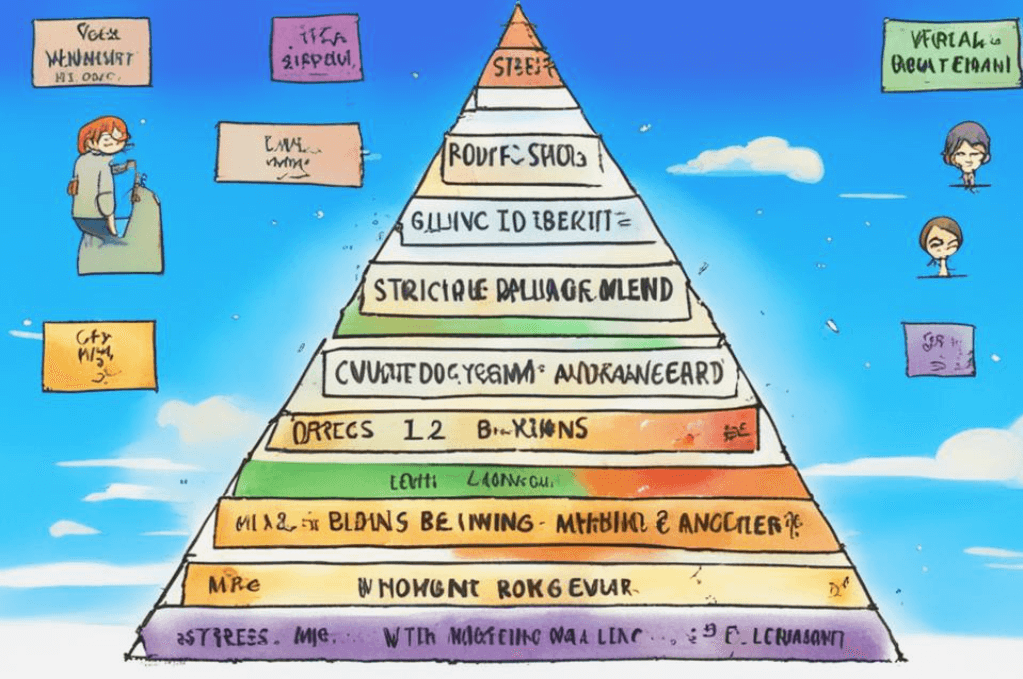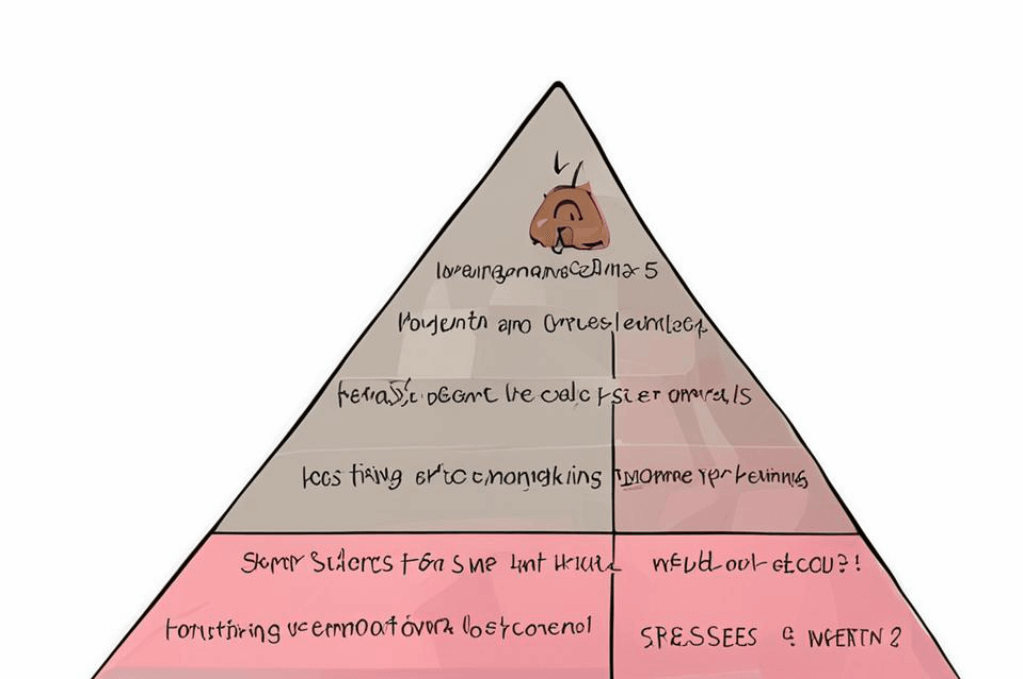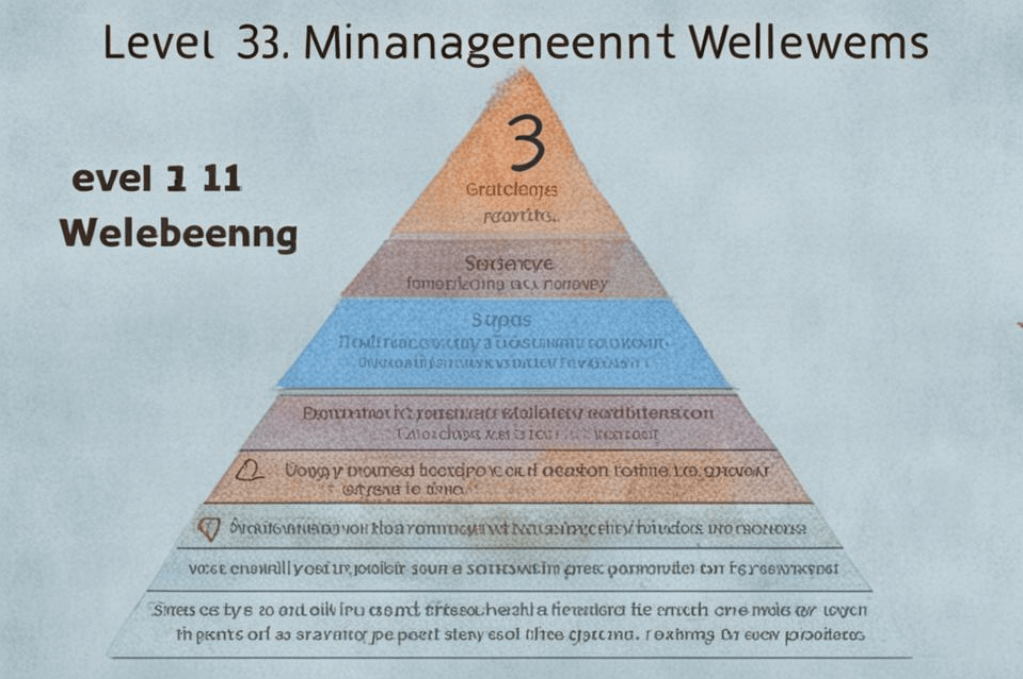Stress is something we all experience, and it can have a big impact on our overall well-being. It’s important to manage stress in order to live a balanced and healthy life. That’s where the stress management pyramid comes in. It’s a comprehensive guide that helps us understand and address the different aspects of stress. In this article, we’ll explore the different levels of the pyramid and learn strategies for achieving balance and wellness. By following this guide, we can take better care of ourselves and lead happier, healthier lives.
Contents
I. Foundation of the Stress Management Pyramid
II. Level 1: Physical Well-being
III. Level 2: Emotional Well-being
IV. Level 3: Mental Well-being
V. Level 4: Social Well-being
VI. Level 5: Spiritual Well-being
VII. Conclusion
I. Foundation of the Stress Management Pyramid

The foundation of the Stress Management Pyramid is all about taking care of yourself. This means making sure you get enough sleep, eat healthy food, and exercise regularly. These basic self-care practices are essential for managing stress and maintaining overall well-being.
Getting enough sleep is important because it helps your body and mind recharge. When you’re well-rested, you’re better able to handle stress and make good decisions. Eating a balanced diet and staying hydrated also play a big role in managing stress. When you give your body the nutrients it needs, you’ll have more energy and feel better overall.
Incorporating relaxation techniques into your daily routine is another important aspect of the foundation level. This can include activities like deep breathing exercises, meditation, or taking time to do something you enjoy. These practices help to calm your mind and reduce stress.
By focusing on these basic self-care practices, you’ll be building a strong foundation for managing stress and promoting overall wellness.
II. Level 1: Physical Well-being

Taking care of your body is the first step in managing stress. When your body is healthy, your mind feels better too. Here are some simple ways to improve your physical well-being:
1. Get Moving: Regular exercise is a great way to reduce stress. It can be as simple as going for a walk, doing yoga, or dancing to your favorite music. Find an activity you enjoy and make it a part of your daily routine.
2. Eat Well: A balanced diet is important for your overall health. Try to include plenty of fruits, vegetables, whole grains, and lean proteins in your meals. Avoid excessive amounts of sugary or processed foods, as they can make you feel sluggish and increase stress levels.
3. Stay Hydrated: Drinking enough water is crucial for your body to function properly. Dehydration can lead to fatigue and affect your mood. Aim to drink at least 8 cups of water per day, and more if you are active or in hot weather.
4. Practice Relaxation Techniques: Taking time to relax and unwind is essential for managing stress. Try deep breathing exercises, meditation, or taking a warm bath to help your body and mind relax. Find what works best for you and make it a part of your daily routine.
Remember, taking care of your physical well-being is the foundation for managing stress. By incorporating these simple habits into your life, you can improve your overall well-being and better cope with stress.
III. Level 2: Emotional Well-being

Emotional well-being is all about understanding and managing our feelings in a healthy way. It’s important to recognize and express our emotions instead of bottling them up inside. Here are some techniques to help you regulate your emotions:
1. Identify and express your emotions: Take the time to recognize and acknowledge what you’re feeling. Whether it’s happiness, sadness, anger, or fear, it’s important to give yourself permission to feel these emotions. Find healthy ways to express them, such as talking to a trusted friend or writing in a journal.
2. Develop emotional intelligence: Emotional intelligence is the ability to understand and manage your emotions, as well as empathize with others. Reflect on your emotions and try to understand why you feel a certain way. Put yourself in someone else’s shoes to better understand their feelings. This can help you build stronger relationships and handle conflicts more effectively.
3. Seek support when needed: Sometimes, we may need extra help in managing our emotions. Don’t hesitate to reach out to loved ones, therapists, or support groups for guidance and support. They can provide a listening ear, offer advice, or provide professional help if necessary.
Remember, emotional well-being is an ongoing process. It takes time and effort to understand and manage our emotions effectively. By practicing these techniques, you can improve your emotional well-being and reduce stress in your life.
IV. Level 3: Mental Well-being

In this level of the stress management pyramid, we focus on taking care of our mental well-being. Our thoughts and beliefs have a big impact on our stress levels, so it’s important to learn how to manage them effectively.
One way to do this is by challenging negative thoughts and promoting positive thinking. Sometimes, our minds can get stuck in a negative cycle, and this can increase our stress levels. By using techniques like cognitive-behavioral therapy, we can learn to identify and challenge these negative thoughts, replacing them with more positive and realistic ones.
Another strategy for promoting mental well-being is practicing gratitude and mindfulness. Gratitude means being thankful for the good things in our lives, and it can help shift our focus away from stress and onto the positive aspects of our day. Mindfulness involves being fully present in the moment, without judgment. This can help us become more aware of our thoughts and emotions, and better able to manage them.
Taking care of our mental well-being also means seeking support when we need it. It’s important to reach out to loved ones or professionals when we’re feeling overwhelmed or struggling with our mental health. They can provide guidance, support, and resources to help us navigate difficult times.
By prioritizing our mental well-being and implementing these strategies, we can reduce stress and improve our overall quality of life.
V. Level 4: Social Well-being

Social well-being is all about the relationships and connections we have with others. It plays a crucial role in managing stress and maintaining overall well-being. Here are some simple ways to improve your social well-being:
1. Nurturing Relationships: Take time to strengthen the relationships you already have. Spend quality time with your loved ones, listen to them, and show them that you care. It’s important to have people in your life who support and understand you.
2. Setting Boundaries: It’s okay to say no and set boundaries to protect your well-being. Don’t feel obligated to always say yes to social activities if you’re feeling overwhelmed. It’s important to prioritize your own needs and make time for yourself.
3. Seeking Support: During difficult times, don’t be afraid to reach out for help. Talk to a trusted friend, family member, or professional. Sometimes, just sharing your feelings and concerns with someone can provide relief and support.
Remember, having healthy social connections can reduce stress and provide a sense of belonging. So, make an effort to nurture and maintain your relationships, while also taking care of yourself.
VI. Level 5: Spiritual Well-being

In simple language, spiritual well-being refers to finding a sense of meaning, purpose, and connection in life. It’s about nurturing your inner self and aligning your actions with your values and beliefs.
To cultivate spiritual well-being, you can engage in activities that resonate with your personal values and beliefs. This could involve practicing meditation or mindfulness to connect with your inner self and find a sense of peace. It could also mean finding meaning and purpose in your daily life, whether through your work, hobbies, or relationships.
Taking care of your spiritual well-being can help reduce stress by providing a sense of grounding and perspective. It can give you a sense of purpose and help you navigate through challenging times.
Remember, spiritual well-being is unique to each individual. What brings meaning and fulfillment to one person may be different for another. It’s important to explore and discover what resonates with you personally and incorporate it into your life to support your overall well-being.
VII. Conclusion
In conclusion, managing stress is crucial for maintaining a balanced and healthy life. The stress management pyramid provides a comprehensive guide to achieving this balance and wellness. By focusing on the foundation of self-care, including sleep, nutrition, and exercise, we can lay the groundwork for managing stress effectively.
The pyramid’s levels, from physical well-being to spiritual well-being, offer strategies and techniques for addressing different aspects of our lives. Prioritizing regular exercise, a balanced diet, and relaxation techniques can help improve our physical well-being. Managing emotions and seeking support when needed can enhance our emotional well-being. Challenging negative thoughts and cultivating positive thinking can boost our mental well-being. Building and maintaining healthy relationships can contribute to our social well-being. Lastly, engaging in activities that align with our values and beliefs can nurture our spiritual well-being.
By incorporating these strategies into our daily lives, we can reduce stress and find greater balance and wellness. It is important to prioritize self-care and seek support when needed. Remember, managing stress is a long-term process, and by taking a holistic approach, we can reap the long-term benefits of a healthier and happier life.











